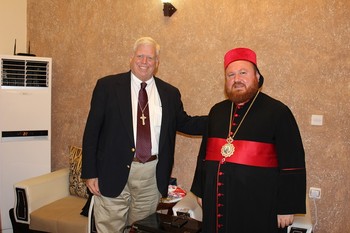It was a scene that will not soon be forgotten: Presbyterian leaders kneeling in prayer alongside Christian partners in the Middle East. They spoke slowly, painfully, to God of a mounting crisis that has enveloped the people of Syria, Lebanon, and Iraq. Heads bowed together, they called out for healing and hope.
Led by Heath Rada, the newly-elected moderator of the General Assembly of the Presbyterian Church (U.S.A.), the visit is a direct response to the 221st General Assembly (2014) and its call on the church to direct its attention to the “maltreatment, sectarian violence, and the persecution in Egypt, Iraq, Syria, Iran, Palestine, Israel, North Korea, Pakistan, and other parts of the world.”
Rada is being accompanied by Presbyterian Mission Agency leaders Sara Lisherness, Gregory Allen-Pickett, and Amgad Beblawi. The delegation spent the first five days visiting with Christian leaders in Lebanon and Syria. This was followed by three days accompanying church partners in Iraq.
The Moderator was there at the invitation of the National Evangelical Synod of Syria and Lebanon (NESSL) to see firsthand the struggle faced by people of all religious backgrounds in the midst of an ongoing civil war in Syria and the recent attacks by ISIS that have led to a refugee crisis.
“It could not have been timelier to have this group visit and get to know the depth of human tragedy facing millions of people in Syria and Lebanon,” says Mary Mikhael, who served as president of Beirut’s Near East School of Theology until late 2011. “We are passing in the valley of the shadow of death and our Christian community is facing unprecedented threats. Yet we are a people of hope because of our faith and partnership.”
“The PC(USA), NESSL, and other organizations are not just partners in the sense that the world understands a partnership,” says Fadi Dagher, general secretary of NESSL. “We are bound by one baptism, serving one Lord, having been made a new creation in Christ, that we might bring glory to God. Together we can show the love of God to those who are suffering—the refugees who have lost all material possessions. We can show love to those who are fleeing from violence and persecution.”
Upon the US group’s arrival in Lebanon, Dagher told them that his visits across the border into Syria have become more frequent, delivering aid and hope in a hopeless situation.
“On our first day here, we visited a refugee camp where Palestinians have lived since 1948. We visited churches and schools of the NESSL and attended a reception organized by our church partners where we met with church and ecumenical leaders from Lebanon and Syria,” says Gregory Allen-Picket, general manager of World Mission for the PC(USA). “We were very blessed by the opportunity to be here.”
“This is a great opportunity for us to stand in solidarity with our partners,” says Rada. “Kneeling in prayer together is a deep privilege and an important role for the PC(USA) at this time.”
Rada and the PC(USA) team also visited the Near East School of Theology, an ecumenical seminary serving students of four denominations from Iraq, Syria, Lebanon, Israel/Palestine, and Jordan. Rada asked one Palestinian student his perspective on the ongoing conflicts.
“We need to start in our own hearts and lives and find the peace of Christ in ourselves,” he said. “Then we can work towards peace in our systems and society, but it needs to start with us.”
Rick Jones is a communications strategist for the Presbyterian Mission Agency.

